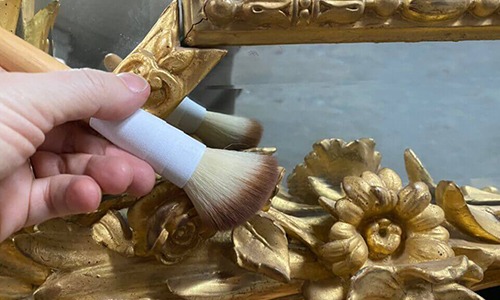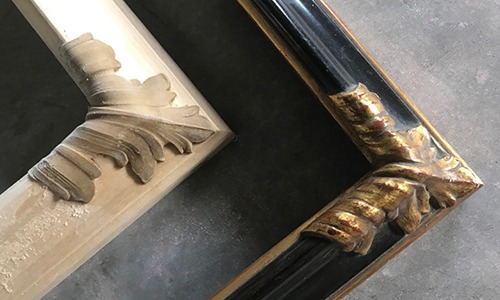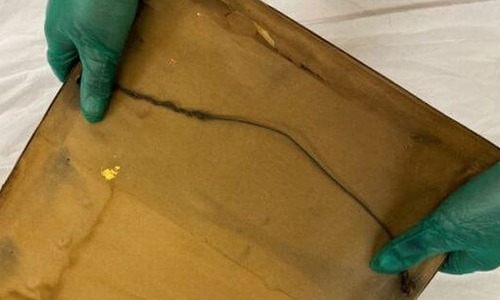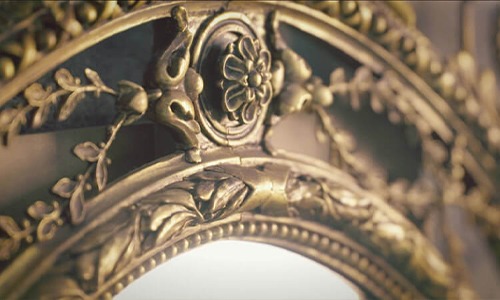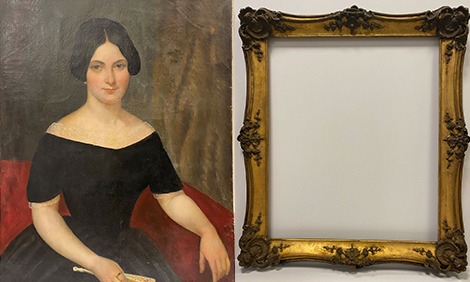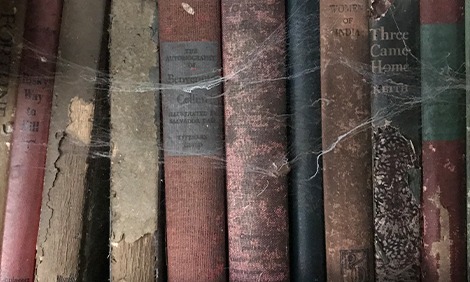Collection Care
Cleaning & Care of Gilded Frames
By April Hann Lanford
Cleaning and Care of Gilded Frames
By April Hann Lanford
Paintings and gilded frames frequently come to our studio that has sustained damage from improper cleaning. While clients attempt to their artwork with the best of intentions, sometimes cleaning can do more harm than good.
All cleaning processes involve contact with the surface of a piece, which causes friction on the surface. This eventually leads to abrasion, which cumulatively can damage the frame. Oftentimes, it is better to have a light accumulation of dust rather than risk inadvertently damaging the frame that you are trying to care for.
Sage advice-Don’t be afraid to allow for a little accumulation of dust.
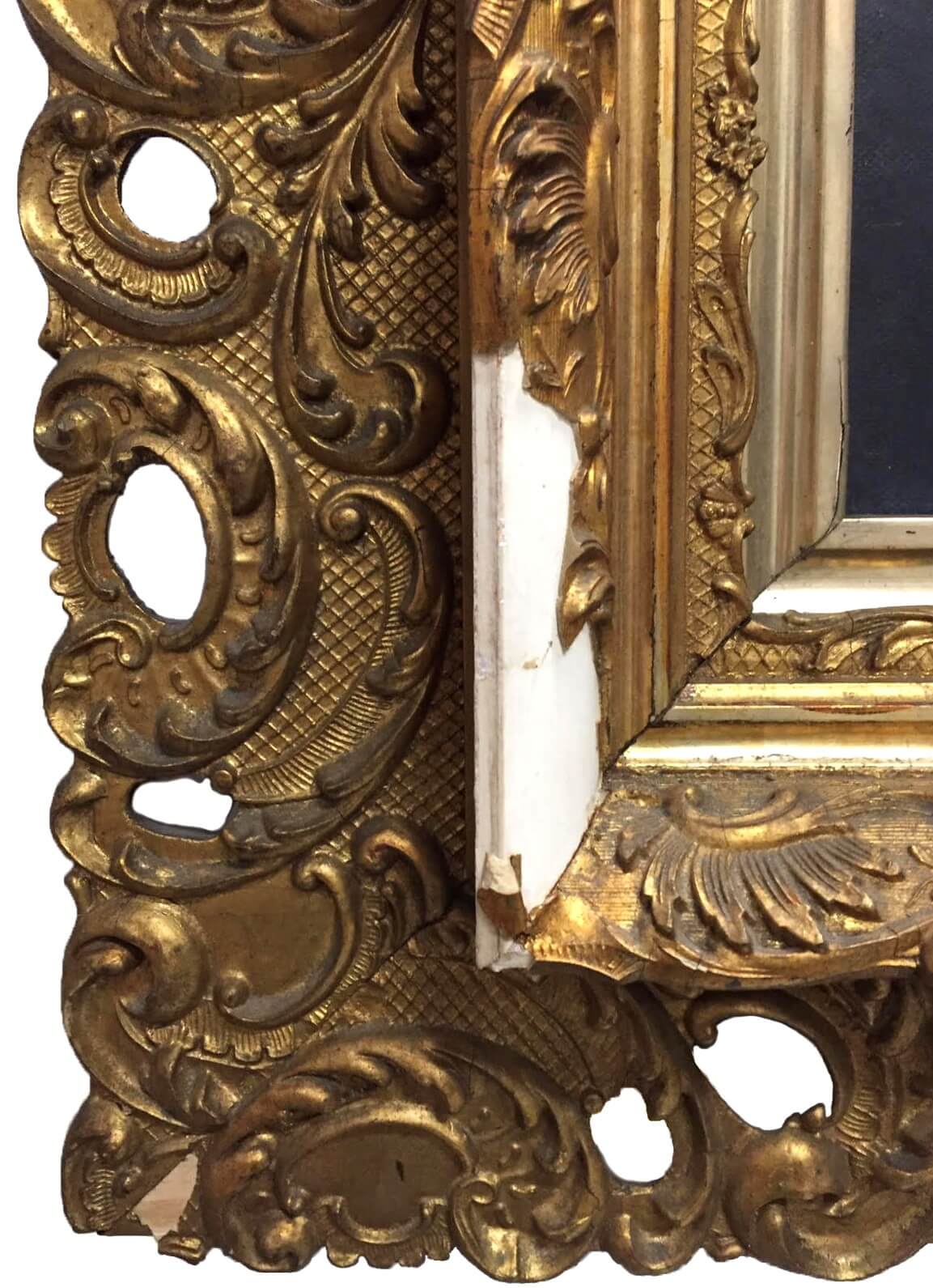
Always Check the Condition Prior to Cleaning
Before any attempts at dusting or cleaning, you should first check to make sure that the surface is stable. If you are concerned about the condition of your frame, it is always best to first document the condition. The easiest way is with images. First, take an overall image, and then take details. Don’t forget about the back as well.
Losses of gilding or gesso, lifting cracks, or lose ornamentation, discoloration, are all indicative of underlying complexities that should be further assessed by a conservator to determine the best approach for proper care.
If you find any detached fragments, always keep those in a bag with the piece so that they can be incorporated in with repairs or conservation in the future.
Cleaning Gilded Surfaces is Not a One Size Fits All Approach
Unless you are a trained conservator, never attempt to use any liquids or chemicals on a gilded surface. Gilt frames have complex surfaces that may involve multiple layers of gold leaf, pigmented toners, wax, etc. Add that to how the frame has aged over time, or varying environmental exposures, damage, or previous repairs, illustrates that each frame is unique.
Some gilding techniques are sensitive to moisture, and the desirable gold surface can actually be wiped away when touched with a damp rag. Contact with glass cleaner can also be extremely detrimental to a gilded surface and its bole and gesso preparatory layers.
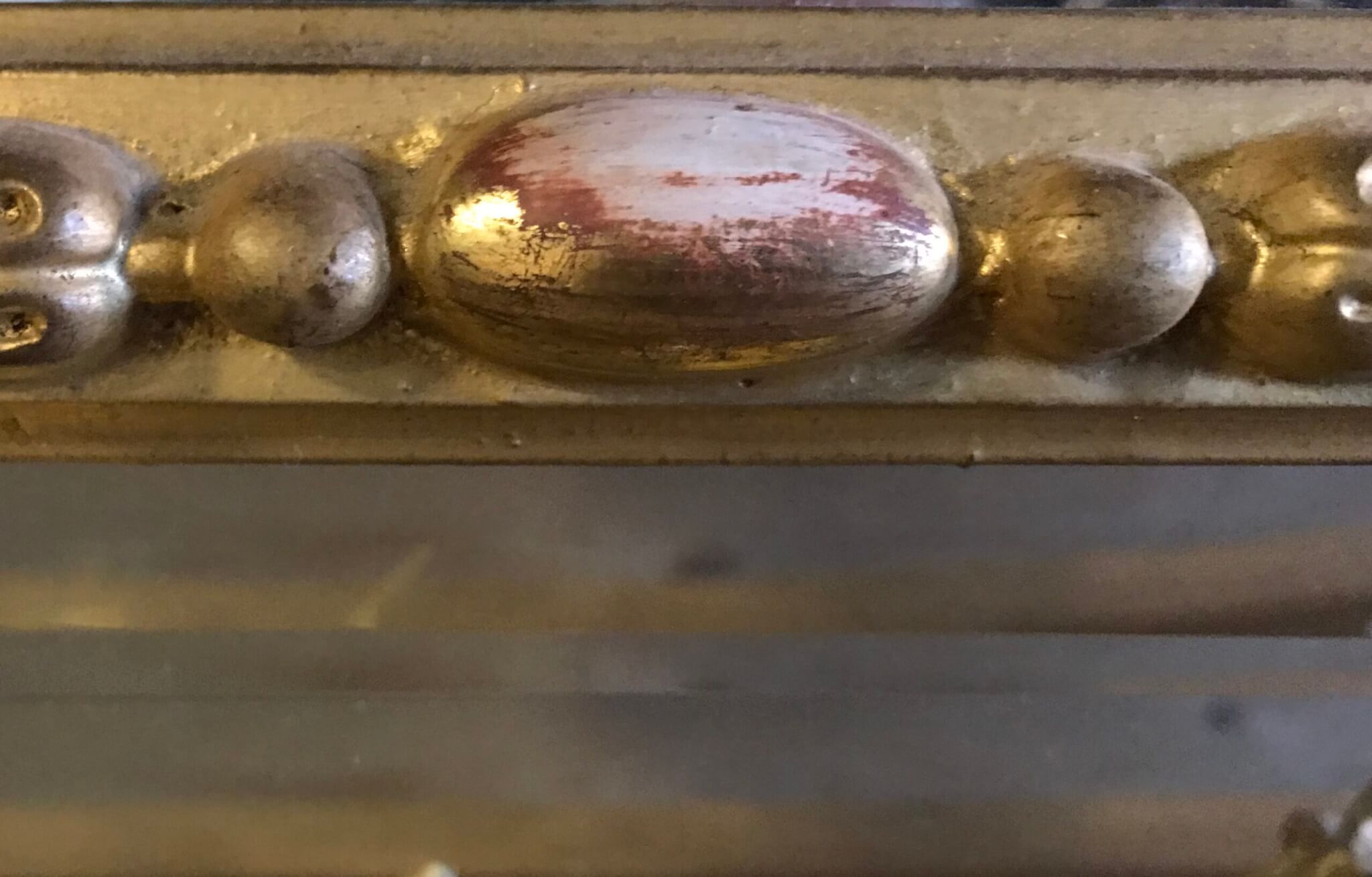
Beware of Previous Repair
If you see areas of darkening or discoloration on an antique frame, it is likely a previous repair that has aged and darkened over
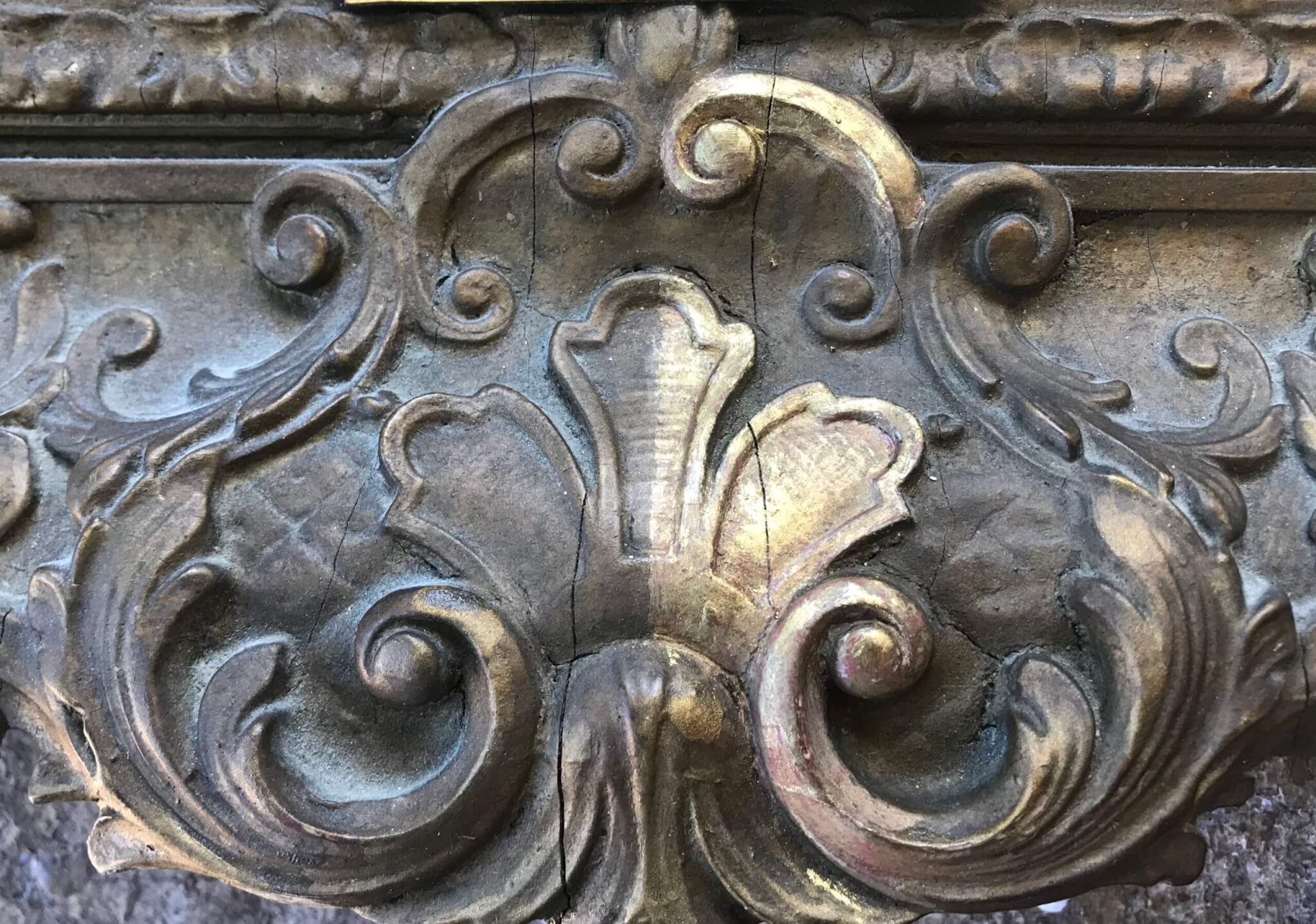
time. In the past, it was common for people to paint over areas of damage on a gilt frame with radiator paint. The paint was brass base which at first had a comparable gold tonality to gold leaf. Over time, the brass elements in the applied paint would oxidize over time and turn to a brown tone. This is often mistaken as the gold having a dirty appearance.
However, it cannot be addressed through general cleaning. The good news is that after careful testing, it is often possible to remove this discolored paint and reveal the original gold leaf underneath. We have revitalized frames completely overpainted to reveal the original gold leaf beneath.
Unique items and surfaces require individual care, which means, that there is not a single tried and true single approach.
Light Dusting-Less is Best
For care at home, gilded frames should only be lightly dusted with a very soft-haired brush. A large natural hair watercolor mop brush or cosmetic brush is preferable. When using these brushes, be sure to cover the metal ferrule to protect the painting from accidental contact with the metal. Dusting should be undertaken with very little pressure or contact with the gilded surface.
Dusting should never be undertaken if there are cracks or flaking evident on the surface. Dusting may further weaken the bond of the gesso/gilding to the wood support and cause further loss to the surface.
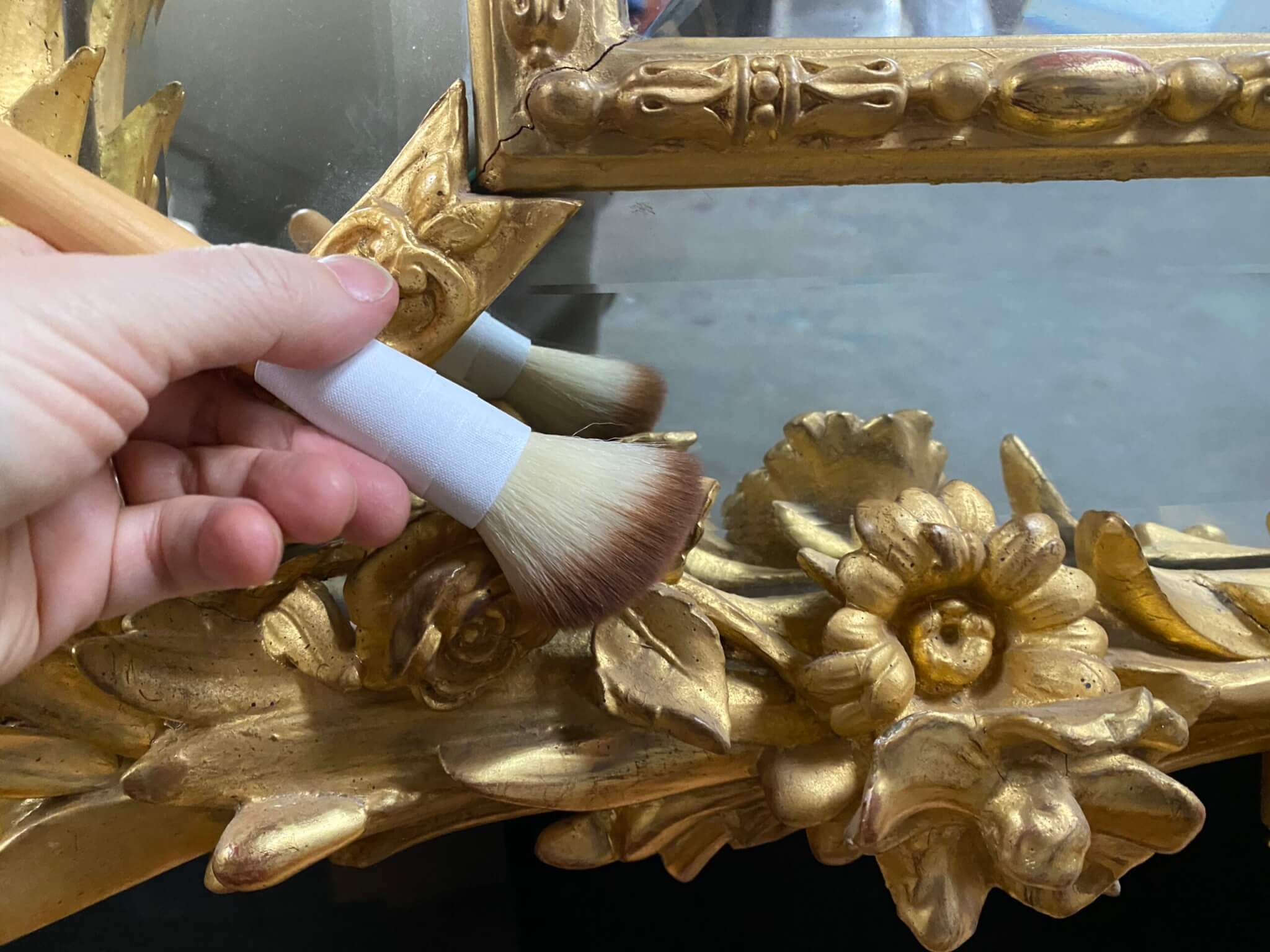
Never Use Feather Dusters
Feather dusters should not be used as the ends of the spines can scratch and abrade the surface. I frequently find the small tips of feathers that have broken off from dusters caught in the crevices of cracks in surfaces in works.
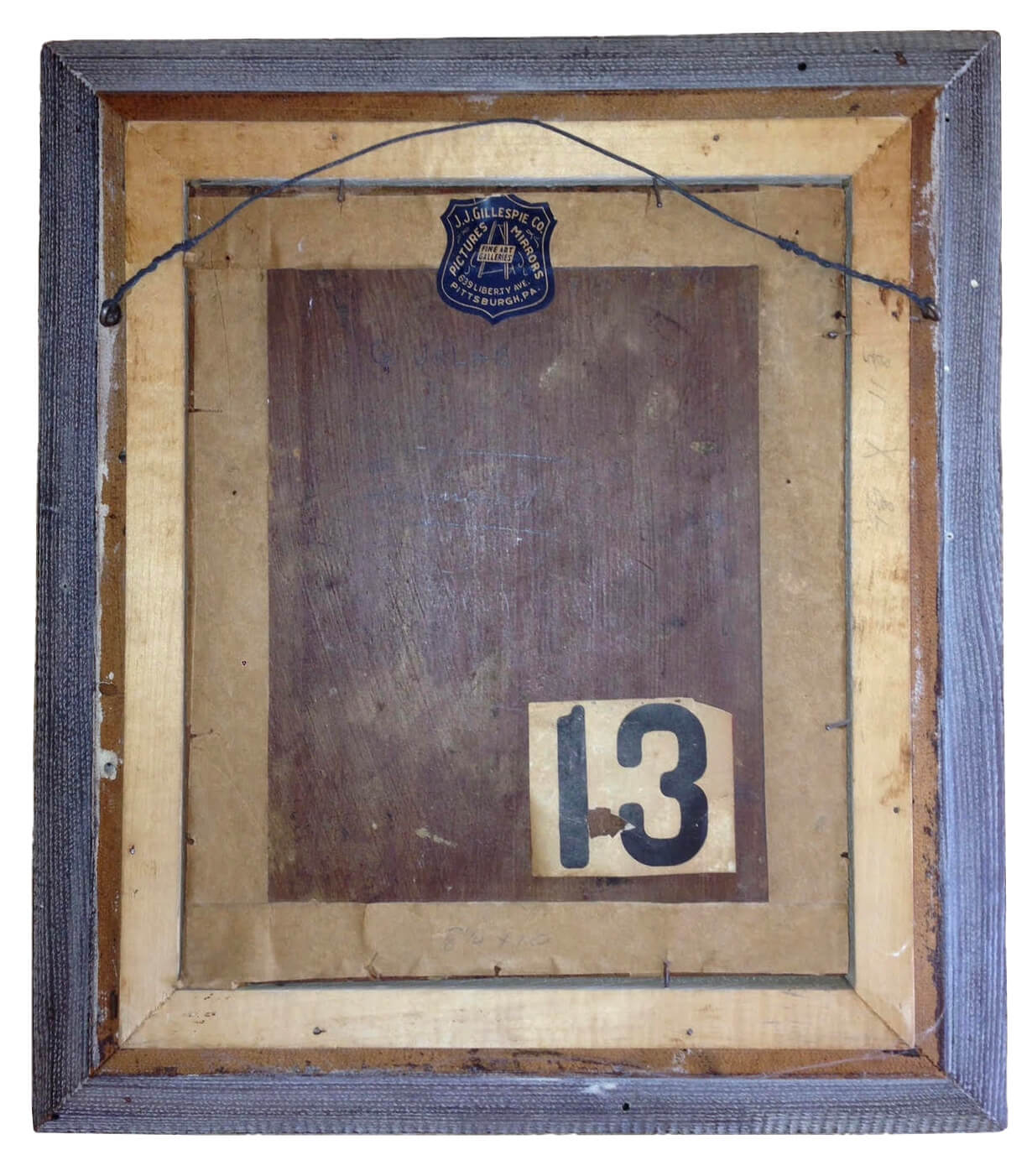
Don’t Overlook the Back
The back of the frame is frequently overlooked. That is likely where the bulk of the accumulated dust will be found. The backs of frames often are unfinished wood and can be cleaned in a more straightforward manner. If a light dusting with a mop brush does not do the trick, a slightly moistened microfiber cloth should suffice.
When cleaning, please watch for provenance labels on the back that are sensitive to handling. These should be not be cleaned and left in situ.
While you have full access to the back, it is also a good time to review the stability of the hanging hardware. Make sure that it is securely mounted to the frame and if there is wire, that it is not corroded, and well affixed to the hardware.
When cleaning gilded frames, it is important to always remember that “less is more”. A subtle buildup of household dust does not necessarily warrant a full cleaning. However, other exposures, such as construction dust, smoke, or mildew should not be taken lightly. Losses of gilding or gesso, lifting cracks, or lose ornamentation, discoloration, are all indicative of underlying complexities
Before attempting to address a concern yourself, you should contact a specialist in the field or conservator. Working with a specialist can confirm the optimal approach to maintain the frame’s historic charm, integrity and avoid the risk of further damage.
If you have any questions about the care of your piece, please contact us at:
312-344-0331
April@artifactservices.com
Our collection of educational articles about
custom framing, collection care, and emergency response are updated regularly.
Click on each topic below for a menu of corresponding articles.
Collection Care Articles
By April Hann Lanford
Our collection of educational articles provides an introduction to many topics about the preservation and conservation of fine art, antiques, and fine furniture.
Topics are often written as a result of questions provided by our clients.
Emergency Care Articles
By April Hann Lanford
Our emergency care articles are a helpful introduction to how to prevent damage through preventative measures or art and antique collections. When a disaster strikes, prompt response and taking the right steps can mitigate further damage.
Antique Trader Articles
By April Hann Lanford
Visit our collection of articles that have been published in Antique Trader.
antiquetrader
For more than 60 years Antique Trader has been inspiring, informing, and entertaining the collecting community with timely...
Projects
By April Hann Lanford
A selection of Artifact’s most recent projects highlighting our conservation and preservation work. We present each unique story describing the conservation process from reviewing the history, cause of loss, and condition to the steps of the treatment.
Glossary
A collection of art and conservation terms along with makers and firms compiled into a glossary and highlighted throughout our website for reference.
We are available to assist you
Main Location
840 N. Milwaukee Ave, Chicago IL 60642
Mon-Fri: 9:00 am - 5:30 pm
Sat: 10:00 am-4:00 pm
Sun: Closed
Complimentary parking is available in the loading zone in front of the building
We can also serve you by appointment at our other locations in the Chicagoland area.
Additional Locations
Schiller Park • Highland Park • Lake Forest • Lincoln Park • Nashville, TN
Copyright 2024, Artifact Services, LLC | An Artmill Group Company
